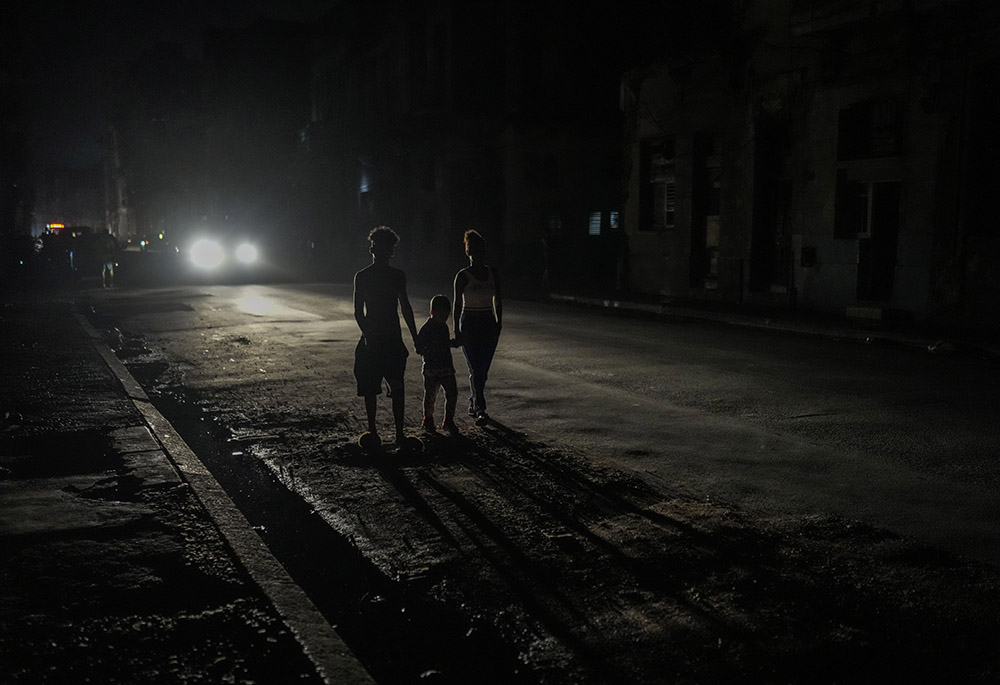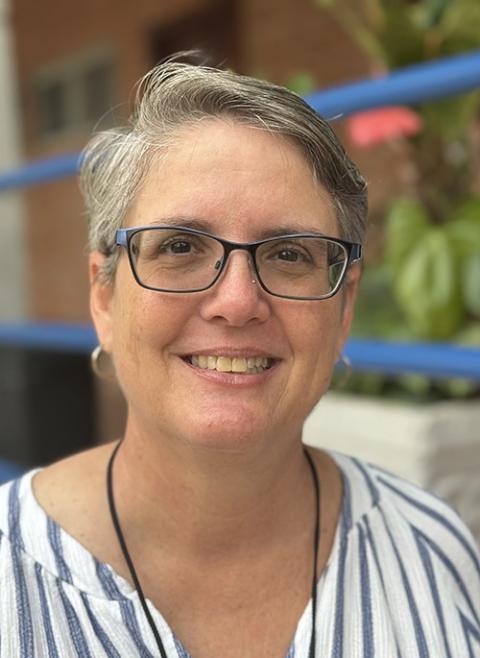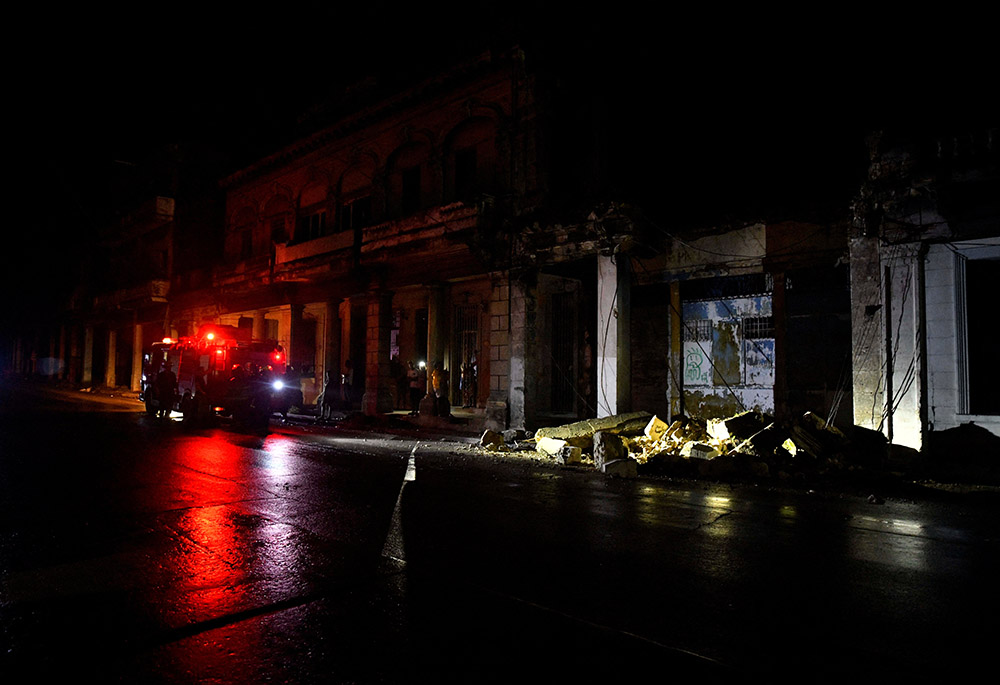
Residents are illuminated by the headlights of a car during a blackout after a major power plant failed Oct. 18 in Havana, Cuba. (AP photo/Ramon Espinosa, file)
Despite years of shortages in Cuba, and now more constant blackouts, Catholic sisters and priests are committed to remain with those suffering on the island.
Since the collapse of the electrical system began Oct. 18, island residents report that what little food they had has spoiled; there are long lines to buy food such as bread; and prices of basic products have skyrocketed out of reach for many.
A dozen lemons and eight tomatoes currently cost "more than many Cubans earn in a month," shared CNN's Havana bureau chief, Patrick Oppmann. Things got worse when Hurricane Oscar hit the island Oct. 20, and Hurricane Rafael (Nov. 6-7) again left the island in total darkness.

Sr. Olimpia González Núñez, of the Society of Teresa of Jesus in Havana, said in an April interview in Honduras that despite shortages in Cuba, religious on the island remain committed to the Cuban people. (GSR photo/Rhina Guidos)
That scarcity, and the effects of power outages, is something consecrated life in Cuba has long grappled with, religious told Global Sisters Report, especially in their ministries to the island's poorest and most marginalized. Consecrated life in Cuba may not be numerous, but there is one adjective to describe religious on the island: "committed," said Sr. Olimpia González Núñez, who until October served as the secretary general of the Cuban Conference of Religious Men and Women, or CONCUR.
"We are few, perhaps 655 religious men and women, in all of Cuba," said González, of the Society of St. Teresa of Jesus in Havana, in an interview with GSR, "but very committed to accompanying the Cuban people."
Through various projects, religious accompany and assist impoverished people, the disabled, the young and the elderly left behind by those who have emigrated. But the most significant way in which religious help Cubans on the island is "to accompany the people in the midst of their hopelessness," González said.
This time of hopelessness includes increasing hunger, rising crime and high inflation, according to a report released in July by the Cuban Observatory for Human Rights. Among some of the report's conclusions:
- Seven out of 10 Cubans said they have eliminated one meal a day due to lack of money or food shortages.
- More than 50% of respondents said they experience power outages.
- About 33% said they do not have access to medicines because of high prices or because medicines are simply not available.
The Catholic Church outside Cuba has been generous to the island's inhabitants, Piarist Fr. Ricardo Alberto Sola, president of Cuba's conference of religious, told GSR in an April interview. Some religious orders channel humanitarian aid to Cubans from abroad, and religious men and women are creative with their meager salaries to offset some of the needs, which include expensive electricity bills to keep their ministries going, Sola said.
"Without those aids, you can't run the mission," he added.
In March, Cubans publicly protested in the streets in and around the island's second largest city, Santiago de Cuba, demanding food and electricity. Protests increased in several parts of the island in October due to frustration over the blackouts.

Firefighters check debris from a house during a blackout after Hurricane Rafael knocked out the country's electrical grid, Nov. 7 in Havana, Cuba. (OSV News photo/Reuters/Norlys Perez)
Cuban authorities blame the U.S. embargo, but some on the island say the government also engages in a type of "internal blockade," a set of rules that they say limits economic, political and social activity inside the island and affects production. Power magazine, on the energy industry, said in its October issue that while economic sanctions by the U.S. have "exacerbated" the situation, "Cuba is in the throes of a severe energy crisis, driven by fuel supply disruptions and compounded by obstacles in securing vital technologies and supplies needed to modernize and operate its aging power plants."
Others say the changing fortunes of Venezuela, its ally, have contributed to the problem, as has the declining generosity of Mexico and Russia, which used to supply the island generously in the past. Reuters reported that Cuba will let a Chinese company put up solar panels and use other solar technology to alleviate some of the problems, although it is not known how they will be financed.
Population decline
But energy is only one of several problems facing those living on the island, and some are forced to seek better conditions elsewhere and have left.
"There are more deaths than births, more migration. And then, abortion, which has always been in Cuba — it is easier to have an abortion than to have a tooth pulled," Sola said.
Some Cubans say that migration is bleeding the country and Cuban society, as families are separated and those who cannot afford to leave remain on the island.
In July, Juan Carlos Alfonso Fraga of Cuba's National Statistics and Information Office said in a report that the island is in a "contraction": Due to the low number of births, accompanied by the influx of people leaving Cuba, the population has declined by 10% between 2022 and 2023, and the island now has less than 10 million inhabitants.
About 1.3 million Cubans "remain outside the country," the report says, adding that "75% of them should be discounted from the population," since they have not resided on the island from 2021-2023.
It appears that the population "will continue to decline," Fraga added in the report.
For the church, the loss of those who are leaving is deeply felt, Sola said.
"A lot of very valuable people leave," he said, and they leave behind those who can't get out. "The number of the country's aging grows, and you're left with a lot of elderly people alone."
Advertisement
Religious life in Cuba lives its prophetic mission accompanying the people, helping from the different welfare projects and the promotion of the person, and choosing to remain, said González.
"When in Cuba, the life project of many Cubans is to leave the country," she added. "The fact that religious life chooses to remain accompanying those who stay, that is a prophecy."
Some religious men and women say that in this way they are responding to what they feel God is asking of them; they are speaking out publicly, denouncing what is happening in the country that violates the dignity of the person, and, above all, transmitting a message of hope, González said.
And they do so in a difficult environment.
Although Cubans are allowed to gather for worship, religious freedom is a more complicated issue — some say it does not exist.
A 2023 State Department report on religious freedom states that Cuba's Communist Party regulates religious activities on the island. The party decides who stays or goes, who receives a religious visa to serve in Cuba, and approves or denies permits for religious celebrations outside of churches.
'When in Cuba, the life project of many Cubans is to leave the country. The fact that religious life chooses to remain accompanying those who stay, that is a prophecy.'
—Sr. Olimpia González Núñez
Because there are not enough local vocations, religious life on the island depends on religious men and women from outside the country to carry out their ministries, but the government can revoke their permission to stay at any time and for any reason.
For example, in a September 2022 interview with Vida Nueva, Jesuit Fr. David Pantaleón, a native of the Dominican Republic who was then in Havana, said he was called by the Communist Party's Office of Religious Affairs on the island during Holy Week that year to inform him that his residency would not be renewed.
Although Cuban officials did not put anything in writing, they told him it was "unfortunate" that he, as president of CONCUR and superior of the Jesuits on the island, had accompanied Cubans who had been imprisoned for protesting, in July 2021, the Jesuit told Vida Nueva.
Because some of them were facing sentences of 15 to 20 years for participating in demonstrations, Pantaleón, along with the board of directors of the conference of religious, wrote a letter publicly defending "the legitimate right of the people to express their discontent."
Shortly thereafter, he was expelled.
González said that, although the faith of the members of the religious communities remains strong in the face of adversity, "at times it has infected us with a bit of discouragement."
But there is a great friendship among the members of the different congregations serving the island, González added.
"We are connected, we help each other, we share, and that helps us strengthen our presence," she said.
But living in scarcity and uncertainty takes its toll.
"We are becoming more and more fragile communities in terms of the number of religious — communities of two or three brothers, sisters. This is felt when it comes to accompanying projects in community life," González said.
"How do we accompany and sustain the hope of the people?" is a question often asked, she said, along with, "Are there ways to rethink the mission, restructure communities?"
God always gives an answer, but you have to discern what it is through prayer, González said.
"I have been discovering that it is important to accompany the people in the midst of despair, to maintain hope for the people," she said. "And prayer, meeting with my brothers and sisters, that is what is helping me to maintain myself as well."






